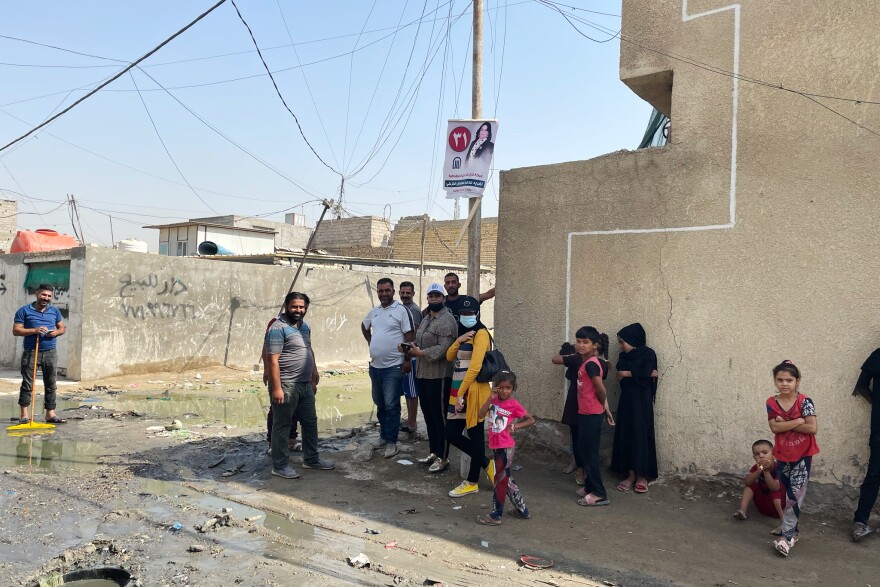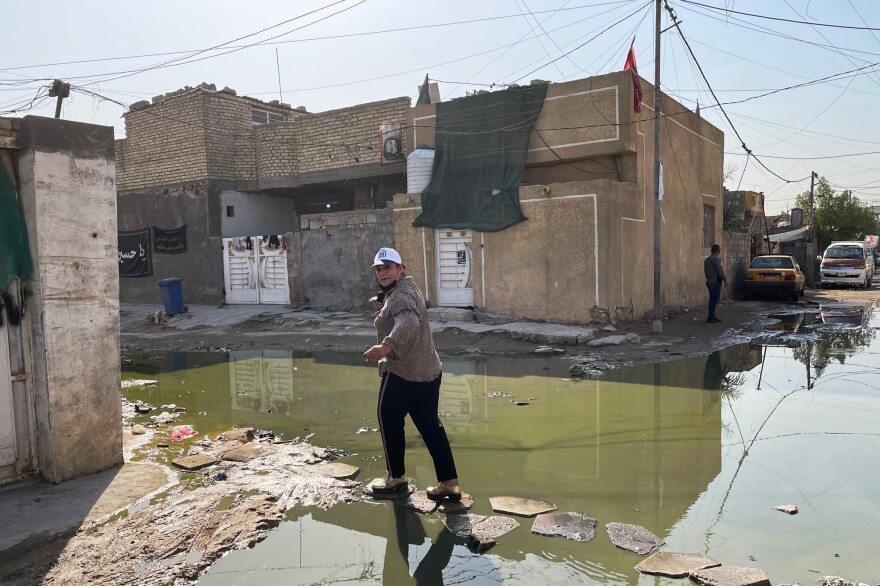BAGHDAD — In 2019, thousands of Iraqis started taking part in huge demonstrations to demand change. They called for an end to rampant corruption that is siphoning their country's oil wealth, for better public services like reliable water and electricity, and for a bigger voice in a government.
The protest movement forced out Adil Abdul-Mahdi, then the prime minister, in May 2020, and triggered new elections. On Sunday, Iraqi voters will go to the polls to elect a new parliament for the fifth time since longtime dictator Saddam Hussein was ousted after the U.S. invaded in 2003.
But many Iraqis say they see no reason to vote. The current parties in power — many backed by militias involved in attacks that killed some 600 demonstrators — are poised to dominate again, according to political analysts. Young Iraqis say they don't see any future for themselves in their country.

While some protesters are contesting the election as candidates, many others have called for a boycott on the vote. The election's eventual outcome will be shaped by powerful players including the country's sectarian leaders, Iran and the U.S.
Here's a look at the vote and key issues.
The parties now in charge are likely to keep the upper hand
After years of seeing existing political parties fail to deliver effective governance, the turnout on Sunday will be a test of how much voters still believe in Iraq's political system. According to Iraq's electoral commission, there are more than 25 million registered voters. There are more than 3,200 candidates for 329 seats in parliament. New parliamentarians will choose the next prime minister, a job currently held by Mustafa al-Kadhimi.
A new election law allows Iraqis to vote for specific candidates instead of broad party lists. It's meant to make politicians more accountable and reenergize an electoral process that has increasingly suffered from voter apathy and fraud.
A major problem, though, is that most newly established political parties or independent candidates don't have the same funds or organizing power as the bigger, established parties. Moreover, some new candidates say their ability to campaign has been hampered by threats and even assassination attempts. These candidates are therefore not expected to win many seats, and existing parties are likely to take the biggest share of the votes.
Among Iraq's majority Shiite population, the Sadrist Movement led by the popular cleric Moqtada al-Sadr will vie for votes with Al-Fateh, an alliance of political parties — many of which are linked to militias — that are influenced by Iran.
Politicians in Sunni-majority areas have been campaigning on promises to help rebuild the many areas that were destroyed in Iraq's years-long fight against ISIS. The party of Parliamentary Speaker Mohammed al-Halbousi, is among the most popular in these areas, although he is challenged by businessman Khamis Khanjar, who has invested heavily there.

In Iraq's Kurdish region, with a population of about 5 million, the Kurdistan Democratic Party of that region's prime minister, Masrour Barzani, is expected to prevail.
Many Iraqis blame the U.S. for their country's governance woes
Iraqi political parties backed by Iran have called for American troops to leave Iraq — it's a central part of their election campaigns. Tensions between the U.S. and Iran escalated in January 2020, after the U.S. killed a top Iranian military commander, Gen. Qassem Suleimani, in a drone strike in Baghdad.
Washington has said the U.S. combat mission in Iraq will wrap up by the end of this year, but that the U.S. will continue to train and advise the Iraqi military. In practice, U.S. troop numbers are expected to remain similar, though the approximately 2,500 U.S. troops in the country will likely be less visible.

Critics say the U.S. shares some responsibility for the failure of governance in Iraq. After the 2003 invasion, the U.S.-backed Iraqi Governing Council established a system of sectarian apportionment, which continues to this day. This quota system divides cabinet roles and ministries and their resources between ethno-sectarian parties. With the country in the grip of a bloody sectarian civil war, this was intended as a way to ensure that different ethnic groups and religious sects had political representation.
Mounting anger against this system, known as the muhasasa, was one of the causes for the popular protests that began in 2019. It is widely seen as a key reason for the problems of governing in Iraq today. It has led to gridlock in parliament and lent itself to widespread corruption and patronage, as political parties siphon off state funds to pay off their supporters or reserve jobs for loyalists.
Results will take a long time to know
The vote will likely be followed by months of negotiations between the main players. It's expected that no party will secure an absolute majority and that the election will be followed by a lengthy bargaining process, as parties build coalitions and divide up control of ministries. This could take months.

The U.S. and Iran will likely have some role in shaping the ultimate outcome. In the past, these countries have essentially signed off on a choice of prime minister that is acceptable to both.
Washington and Tehran both have an interest in established political parties continuing to wield power under the existing political system.
For the U.S., maintaining the status quo is safer than not, and will help avert any potential new crisis for President Biden's White House after the chaotic U.S. pullout from Afghanistan. It also allows the U.S. to keep American troops in the country in some form and to continue to have influence in a country of strategic importance in the Middle East.
Meanwhile, Iran's influence in Iraq's government has grown, and Tehran has strengthened the power of Iraqi militias it backs.
But keeping the status quo is at odds with what many Iraqis want. They crave changes that they hope will yield a better quality of life.
Many of the protesters who risked their lives to bring about these elections now say they will boycott them, believing they will bring little real change. They say they will keep pushing for reform through demonstrations — not via Sunday's ballot.
Copyright 2021 NPR. To see more, visit https://www.npr.org.







